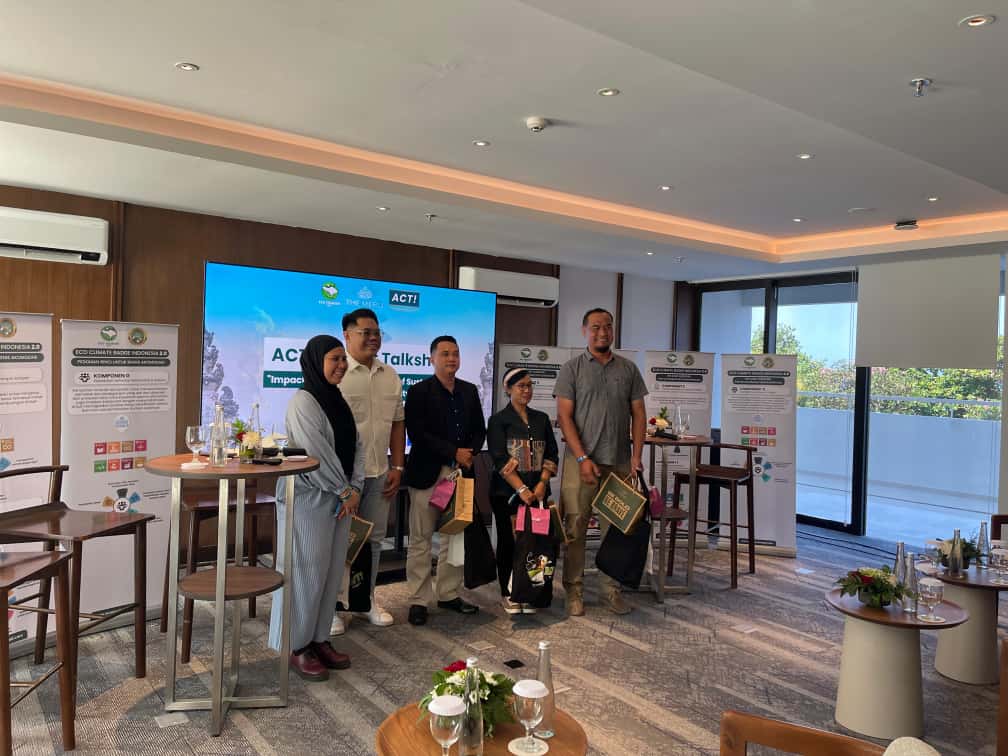
Eco Tourism Bali Leads World Tourism Day 2025 in Bali: Tourism and Climate Action
Eco Tourism Bali proudly hosted the 3rd Series of World Tourism Day, carrying the global theme “Tourism & Climate Action” on Thursday, October 8, 2025, at The Meru Sanur-Bali. The event gathered more than 300 key stakeholders from across sectors, government representatives, hospitality leaders, associations, communities, and sustainability partners, all united by a shared mission: to make tourism part of the climate solution.
The event was proudly supported by the Exclusive Sponsor by The Meru Sanur and ACT! Project — a consortium led by the Rainforest Alliance in collaboration with SCOPI (Sustainable Coffee Platform of Indonesia) and CSP (Cocoa Sustainability Partnership) — with funding provided by the European Union through the SWITCH-Asia Programme. This year’s celebration reinforced collaboration and commitment to ensure that sustainability in tourism goes beyond statements, transforming into real, measurable actions that drive positive environmental and social impact.
"ACT! Project aims to reduce negative social and environmental impacts of domestic food consumption, especially of coffee, chocolate, tea and palm oil through transformation in the tourism and retail sectors. Eco Tourism Bali is the right partner for ACT! Project to encourage procurement practices and promotion of sustainable coffee, tea, chocolate, and palm oil-based products among hotel, restaurant, café, and retail businesses. The celebration of World Tourism Day serves as relevant avenue to share the initiative and collaboration, aligning with the launch of the Sustainable Procurement Guideline for HORECA sector by Eco Tourism Bali," said Margareth Meutia, Manager Consumer Campaign and Engagement of Rainforest Alliance Indonesia who leads the implementation of ACT! Project.
The full-day program will also open with a keynote speech by Ibu Ni Luh Puspa The Vice Minister of Tourism. She emphasizes and reminds us that
“Today, global travelers have become more conscious. They assess the quality of a destination not by the number of stars on its hotels, but by how well the environment is protected, how local communities are involved and empowered, and how all sectors are managed with transparency and accountability. This is the new meaning of “premium”: tourism that is high-quality, fair, and sustainable. Bali’s greatest asset is not just its beaches or its rice fields but its people, who preserve the harmony between nature and culture. This is an invaluable treasure that must be protected together.”
The launch of two milestone initiatives: the Sustainable Procurement Guideline for HORECA and the updated Eco Climate Badge 2.0 for hotels. Both tools aim to accelerate the adoption of climate-friendly and socially responsible practices within the tourism ecosystem. In her opening remarks, the Co-Founder of Eco Tourism Bali, Suzy Hutomo, highlighted the organization’s four-year journey from raising awareness to driving concrete climate action within the tourism sector.
“Today, we’ve moved beyond awareness, we are taking real action and providing practical tools for businesses to implement sustainability with credibility and measurable impact,” she said.
Two significant milestones were announced during the event:
Sustainable Procurement Guideline for HORECA Sector
In collaboration with Kopernik and KEM (Koalisi Ekonomi Membumi), Eco Tourism Bali introduced a comprehensive guideline to help hotels, restaurants, cafe, and their suppliers ensure truly sustainable supply chains.
“Real change happens not only in operations but throughout the supply chain that supports tourism,” the Co-Founder emphasized.Launch of the Eco Climate Badge 2.0
The upgraded version of Eco Tourism Bali’s sustainability verification program now integrates ESG (Environment, Social, and Governance) principles. Expanding beyond environmental performance, the new badge offers a holistic approach to sustainability, empowering local tourism businesses to measure and communicate their impact with greater transparency and credibility.
For the first time, this year’s celebration also introduced a Business Matching Session, connecting sustainability suppliers and our verified Horeca members to foster collaboration and responsible sourcing within the tourism ecosystem.
The day will also conduct the dynamic panel discussions featuring sustainable hospitality leaders and host an Inter-generational session by Melati Wijsen, young climate advocate, will share how youth voices are shaping business and industry for a green, sustainable future. Moreover, the Eco Games for Young Makers as the interactive challenges on creative ways to protect our environment.
Eco Tourism Bali, in collaboration with The Meru Sanur, also hosted an engaging educational activity for local Banjar children, emphasizing the importance of protecting Bali’s natural beauty — its forests, oceans, and coastlines.
“The future of Bali’s tourism depends on how well we protect what we love today,” the Co-Founder concluded.
“Let’s continue working together for a climate-positive, nature-positive Bali.
It was highlighted that tourism plays a distinctive role in shaping sustainable consumption and production. Fito Rahdianto, the Executive Director of Koalisi Ekonomi Membumi (KEM) emphasized that “Through our collaboration with Eco Tourism Bali, KEM aims to ensure that sustainability is not just an aspiration but a practice that strengthens Indonesia’s responsible bioeconomy, uplifts local communities, and protects our natural resources. With the Sustainable Procurement Guideline and the Business Matching session, we also bring the KEM Companies Network into the tourism business ecosystem to accelerate climate-resilient supply chains.”
With 30 sustainability suppliers, 30 Eco Tourism Bali verified members for business matching, and 300 participants, World Tourism Day 2025 promises to be one of the most significant gatherings of sustainable tourism leaders in the region. Beyond celebration, the event aims to build practical pathways toward climate-resilient tourism, positioning Bali as a model for other destinations across the globe.
